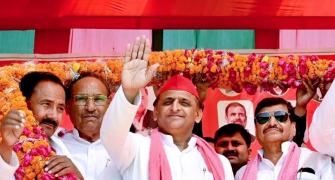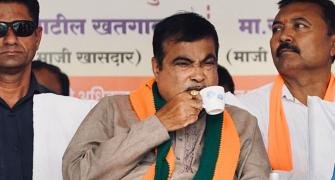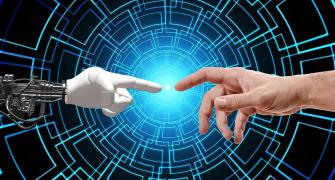Over 90 Indian-American community leaders and political activists, who were catalytic in pushing through the passage of the enabling legislation to facilitate the US-India civilian nuclear agreement overwhelmingly in the House and Senate, and also ensuring the conference committee report was completed and voted on before the end of the lame-duck session on December 8, will be part of history on Monday.
They will join the key protagonists of the conference committee and co-authors of the House and Senate bills at 10.45 am in the East Room of the White House when President George W Bush signs the first part of the enabling legislation into law that when completed in full -- after India and the US complete the bilateral civilian nuclear cooperation agreement known as the 123 Agreement, and New Delhi finalises a safeguards agreement with the International Atomic Energy Agency on its civilian nuclear facilities and the Nuclear Suppliers' Group vote by consensus to okay the deal -- will envisage the transfer of civilian nuclear reactors and other nuclear technology banned from export to India for the past 30 years.
Besides the co-authors of the House bill -- US Representatives Henry Hyde, after whom the bill has been named, and Tom Lantos, GOP chairman and ranking Democrat on the House International Relations Committee -- and the co-author of the Senate bill Senator Richard Lugar, Republican chairman of the Senate Foreign Relations Committee --other influential lawmakers who will flank the president as he signs the bill and be up on the stage with him will include US Representatives Gary Ackerman, the Democratic co-chair of the Congressional Caucus on India and Indian-Americans, Joe Crowley and Joe Wilson, the Democrat and Republican ex co-chairs of the India Caucus, Senator John Cornyn, Republican co-chair of the Friends of India in the US Senate, Senate Majority Leader Bill Frist and Senate Minority Leader Harry Reid, who will take over as majority leader come January by virtue of the Democrats capturing both the Senate and House in the November 7 Congressional elections.
Also joining them will be several leaders in business and industry, led by Ron Somers, president of the US-India Business Council, who were also part of the broad coalition under the umbrella of the Coalition for Partnership with India that have been pushing aggressively for the deal, arguing that is could bring as much as $100 billion in contracts for American industry as well as several thousand jobs.
And last but not least, right by the president's side would be the key driving forces behind the agreement in the Bush administration, Secretary of State Condoleezza Rice and Under Secretary of State for Political Affairs Nicholas Burns, the chief US negotiator of the deal.
One conspicuous absentee at the ceremony will be Senator Joseph Biden, the ranking Democrat on the Senate Foreign Relations Committee, who co-authored the Senate bill with Lugar and co-opted his Democratic colleagues -- including several of whom were reluctant to sign on to a piece of legislation that the non-proliferation lobby had argued would undermine the Nuclear Non-proliferation Treaty since India is not a signatory -- to vote for the bill that ensured a massive 85-12 margin in its favor.
Sources close to Biden told rediff.com that Monday is the death anniversary of Biden's first wife and daughter who had died in a car-crash several years ago, and that Biden on this particular day never participates in any public event and always reserves this day to mourn their loss private with the rest of the family.
White House officials were also hoping very much that Congressman Hyde, the 82-year-old lawmaker, who has retired from Congress since December 8 and is in poor health, will not cry off at the last minute because besides the legislation being named after him, a special tribute to him has been planned at the ceremony and the lead-off special pen with the White House logo and the presidential seal with which Bush intends to sign the agreement is to be gifted to Hyde.
Bush is also expected to sign the agreement with three or four more pens so that the likes of Lugar and Lantos and maybe even Frist and Reid could also be gifted with a pen that 'officially' signed the deal.
Administration sources told rediff.com that even though the ceremony is not expected to last more than 15 minutes -- during which the president will thank the key players, including the Indian-American community and acknowledge their contributions and also briefly describe the importance of the bill to the growing US-India strategic partnership -- the number of people who will fill up the East Room has already swelled up to 170.
But while virtually all of the Indian-American community leaders and activists who had some role to play in pushing for the passage of the bills first in the House and then in the Senate and finally the conference report in both chambers, have been invited, one persona non grata was Democratic Party activist Ramesh Kapur, who founded the US-India Security Friendship Council, also solely to push though the deal and co-opted leading veteran groups to support the agreement, which in turn had given some kind of cover to the Democratic lawmakers usually pilloried by the Republicans for being soft on security to lend their endorsement to the India nuclear agreement.
According to sources, Kapur, who had earlier got in the face of Bush's chief senior political advisor and White House Deputy Chief of Staff Karl Rove at a White House briefing more than two months ago and accused the president of not going to bat for his own bill, and also later had a slanging match and had been abusive to another senior White House official, had not been invited even though the likes of Senator John F Kerry of Massachusetts had urged the White House to invite Kapur -- who is one of his constituents and one of his key fund-raisers, in addition to being a long-time member of the Democratic National Committee and an erstwhile trustee of the DNC.
After the ceremony, Ambassador Raminder Jassal, deputy chief of mission at the Indian Embassy -- who is currently the charge d'affaires in the absence of Ambassador Ronen Sen, who is in New Delhi providing talking points to Prime Minister Manmohan Singh and External Affairs Minister Pranab Mukherjee to argue the merits of the agreement in Parliament -- has invited all of the Indian-American community leaders and activists and representatives of business and industry and several senior Bush administration officials to the embassy for a celebratory luncheon.
Meanwhile, senior administration officials and also some of the staunch supporters of the Bharatiya Janata Party among the Indian-American community who have even been recipients of special awards during the tenure of the BJP-led coalition in New Delhi, were not overly concerned over the BJP and the Leftist parties opposition to the deal, saying this was all "a case of posturing," and "simply playing to their base," and acknowledged that privately they had indicated that in the final analysis, they would support the deal.
In fact, an indication of this was provided by Burns himself in an interaction with a few Indian correspondents immediately after his return from New Delhi, when he seemed to imply that the vibes he received after meeting with BJP parliamentarians were that they were generally on board.
When Burns was asked why his meeting with former external affairs minister in the (Atal Bihari) Vajpayee government Jaswant Singh did not take place, he said it was essentially due to a conflict of schedules.
"His party called an emergency meeting and so he could not make the meeting, and I was already scheduled for day-long talks with Foreign Secretary (Shiv Shankar) Menon and Jaswant went out of town the next day. But I had a very nice phone call with him, where we were very sorry that our respective schedules conspired to prevent our meeting," Burns said.
Burns, however, noted, "I was able to meet with his son -- I had dinner with his son -- and I also had good contact with a number of members of the BJP. I met many of the BJP parliamentarians in a meeting that I had with parliamentarians, and also at a dinner that Ambassador (David) Mulford hosted, and I think we got contacts with the BJP on this issue."
He also described as "erroneous" reports that the Left parties had refused to meet with him to discuss the nuclear deal, saying, "I was not aware that they had decided not to meet with me and I didn't seek a meeting with the Left parties. That is erroneous actually."







